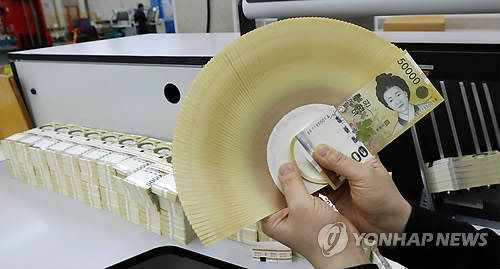The use of 50,000 won ($42.85) denominated banknotes has become more widespread, replacing smaller 10,000 won bills, central bank data showed Tuesday.
According to the Bank of Korea, the circulation of 10,000 won banknotes at the end of last year was 16.24 trillion won, 5.7 percent less than the year before and the smallest since 1998.

Circulation is measured by the total value of banknotes issued minus the amount that has been retrieved by the central bank.
Circulation of 10,000 won bills peaked in 2008 at 26.7 trillion won, accounting for 86.8 percent of the total of all paper currency and coins.
After the introduction of 50,000 won-denominated banknotes in June 2009, the circulation of the smaller currency began to drop.
From 23.26 trillion won at the end of 2009, it dropped to 17.23 trillion won in 2015 before slipping further in 2016.
Circulation of 50,000 won bills increased from 9.92 trillion won in 2009 to 75.77 trillion won last year, a 7.6-fold jump accounting for 77.8 percent of the total, BOK data showed.
"The 10,000 won banknotes are coming back to the Bank of Korea in large quantities as people are increasing their use of 50,000 won bills," a BOK official said. "The bigger-denominated banknotes are probably more convenient to use."
Finance officials, however, say the 50,000 won notes are still not in full circulation, meaning that individuals are using them more to stack up on cash at home than for everyday spending. In the case of 10,000 won notes, the BOK issued 13.44 trillion won last year and recovered 14.43 trillion won, a retrieval rate of 107.3 percent. For 50,000 won notes, the retrieval rate was much lower at 49.9 percent.
For coins, the circulation amounted to 2.34 trillion won last year, an increase of 3.4 percent. The BOK announced it will seek to create a coinless society from this year, but data showed coins of all values were being more widely used. (Yonhap)









![[Kim Seong-kon] Democracy and the future of South Korea](http://res.heraldm.com/phpwas/restmb_idxmake.php?idx=644&simg=/content/image/2024/04/16/20240416050802_0.jpg&u=)







![[KH Explains] Hyundai's full hybrid edge to pay off amid slow transition to pure EVs](http://res.heraldm.com/phpwas/restmb_idxmake.php?idx=652&simg=/content/image/2024/04/18/20240418050645_0.jpg&u=20240418181020)

![[Today’s K-pop] Zico drops snippet of collaboration with Jennie](http://res.heraldm.com/phpwas/restmb_idxmake.php?idx=642&simg=/content/image/2024/04/18/20240418050702_0.jpg&u=)